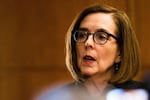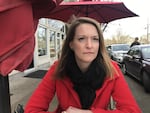A group called Priority Oregon ran more than a million dollars in TV ads criticizing Gov. Kate Brown last year, all while keeping its donors secret.
The most controversial ad featured a woman reading young kids a book titled “Kate Brown’s Oregon.” As she reads, she says there are “homeless camps everywhere, foster care children don’t get enough to eat [and] seniors are abused in nursing homes.”
Brown’s campaign unsuccessfully sought to get the ad off the air and the governor recently said that “people were horrified by those ads. I think Oregonians deserve better and they need to know who is funding those campaigns.”

Oregon Gov. Kate Brown speaks to reporters from her ceremonial office in the state Capitol in Salem, Ore., Monday, Jan. 14, 2019.
Bradley W. Parks / OPB
Now, as Brown and other lawmakers move toward tightening lax campaign finance laws, there’s also a move to bring the spending of so-called “dark money” groups like Priority Oregon into the daylight.
Would-be campaign finance reformers say it’s not enough to simply limit how much money donors can give to candidates. They say they also have to do something about the proliferating array of groups that run their own political advertising, often without revealing their financial backers.
Lawmakers are also looking at requiring a wide array of political committees to list their biggest contributors right on their advertising, which California and Washington already do.
Supporters say that would give voters more information about gauzy-named political committees with no indication for what special interest they might actually represent.
“You could have a political action committee that is ‘Wonderful Oregonians for Kittens,’ that is funded by the tobacco companies,” said Rep. Dan Rayfield, D-Corvallis.
History With Campaign Limits
Oregon is one of the few states with no limits on how much donors can give to candidates in state races, which has helped fuel some of the most expensive legislative races in the country.
But the state learned in 1996 that strict voter-approved limits on campaign donations can drive money to independent advertising campaigns.
The $100 limit per donor to a lawmaker did help drive down the overall cost of legislative campaigns to $3.4 million, less than half the $7.5 million price tag in the previous election cycle.
Related: Oregon Gov. Brown's Campaign Says Attack Ad Is Untrue, Illegal
Even with the limit in place, more than a third of the 1996 total, $1.2 million, was spent by interest groups that operated separately from the candidates.
For example, the Oregon Education Association, one of the more powerful forces in state politics, spent nearly $700,000 on independent advertising promoting its favored candidates and attacking those it opposed. OEA officials made it clear that despite the limits on candidate donations, they weren’t willing to surrender their clout in legislative races.
“We played the game that was the game in town,” OEA lobbyist Laurie Wimmer told The Oregonian at the time. The voter-approved limits were struck down by the Oregon Supreme Court in 1997, which ruled that they violated state constitutional free-speech standards.
The court’s ruling cast doubt on whether any limits on candidates would pass legal muster in Oregon. The landmark Citizens United ruling in 2010 created further barriers to limiting campaign spending.
Under Citizens United and other key U.S. Supreme Court rulings, state and federal laws can’t prevent spending on political advertising by corporations, individuals or interest groups that operate independently of candidates. The court said they have a constitutional right to spend as much as they want to express their political views.
Even without the host of local and federal protections for political spending, some question if there are persistent loopholes in the system that lead to groups like Priority Oregon.
“You can put caps on direct contributions to candidates,” said Rayfield, “but that money pops up somewhere else, like a game of whack-a-mole.”

Oregon Rep. Dan Rayfield, D-Corvallis, sits in the House chamber.
Casey Minter / OPB
Increasingly, states have been demanding more disclosure from groups that operate behind the shield of tax laws protecting the privacy of nonprofits. This year, Oregon legislators are considering a bill that would require groups like Priority Oregon to publicly report their chief donors.
“You can’t stop dark money under Citizens United,” said Portland attorney Jason Kafoury, who has led successful efforts to limit campaign spending in Multnomah County and the city of Portland. “The only thing you can do is disclose who’s giving them money and shame them into not doing it.”
Gov. Brown and legislative leaders are currently moving toward sending a proposed constitutional amendment to voters that would explicitly allow such caps. At the same time, many lawmakers and campaign finance watchdog groups want to couple the limits with some type of program to provide public funding to campaigns. They say that gives them a way to raise money to get their message out without relying on special interests.
They also want to find a way to reduce – or at least expose – the role of dark-money groups and other independent campaigns.
Business Interests
Nationally, dark money groups are playing an increasingly large role. In last year’s November elections, independent political committees reported spending more than $1 billion. In many close races, they dwarfed the amount spent by the candidates themselves. And this does not include spending by nonprofits that don’t report to federal election authorities.
In Oregon, a number of politically-oriented groups have nonprofit arms that run ads commenting on politicians.
But Priority Oregon played an unusually prominent role for a nonprofit in the 2018 elections.
The governor’s political spokesman, Thomas Wheatley, said that ad buyers for Brown’s campaign estimated Priority Oregon spent about $1.5 million on those commercials in July and August.
Erica Hetfeld, Priority Oregon’s executive director, wouldn’t provide any numbers about her group’s spending. But she called Wheatley’s estimate “pretty low.”
She said the amount ran into the “millions” when spending on all forms of media is included. The group also ran ads that criticized legislators supporting gross receipt taxes, as well as “cap and trade” legislation aimed at fighting climate change.
Hetfeld makes no apology for the bruising ads against Brown and key Democratic agenda items – nor for keeping donor names secret.
“I think what we were able to do is set the stage for the election and help people understand that there are major issues in our state government that need to be discussed,” she said.

Erica Hetfeld, executive director of Priority Oregon.
Jeff Mapes / OPB
She noted that the state already has a law requiring disclosure for groups that run advertising mentioning a candidate within 60 days of a general election or within 30 days of a primary. Priority Oregon was careful to stay outside that window.
The group, organized as a social welfare nonprofit under 501(c)(4) of the IRS code, promotes itself as supporting policies to improve the economy and provide more “family-supporting jobs.” The group is believed to have several business-oriented donors and reported receiving nearly $1.2 million in contributions in 2017, its first year of operation.
Priority Oregon does not yet have to file a 2018 disclosure report with the IRS. But when it does, there won’t be any hint of where the money comes from.
Hetfeld, a former Salem lobbyist for several business interests, said her group’s donors have legitimate reasons for staying secret.
“Government officials, who if they disagree with what you’re saying to the public, can use the tools of state government to harass you, bully you, try to put you out of business,” she said.
The Politics Of Political Cash
Rayfield, the Corvallis legislator, has introduced two measures aimed at requiring nonprofits to publicly report their large donors in certain cases. Under House Bill 2709, that would occur if the group places advertisements that "could only be interpreted by a reasonable person" as advocating the defeat or election of a candidate.
Rayfield dismissed Hetfeld’s claim that the Priority Oregon ads weren’t aimed at hurting Brown’s re-election campaign.
“I would challenge them to run that ad with a hundred people in the room and ask those people if it was a political hit ad,” Rayfield said.
Portland attorney Dan Meek, a longtime activist fighting for tight campaign finance limits, argued that it’s not enough for Priority Oregon to avoid running ads in the last weeks of an election.
“You can destroy a candidate’s reputation outside that window,” Meek said.
Ian Vandewalker, a campaign finance expert at the Brennan Center for Justice at New York University, said there have been several legal cases making it clear that states and the federal government can require more disclosure from nonprofits.
Subscribe To 'OPB Politics Now'
Subscribe to the show on NPR One, Apple Podcasts or wherever you find your podcasts. Need to get in touch? Contact us here.
“Donor disclosure,” he said, “should hinge not on how you organized a group – whether you checked this box or that box – but on, ‘Are you doing political activity?’”
But it's tricky new ground for Oregon. Rayfield said he is still trying to figure out where to set the threshold in his bill for requiring donor transparency. Currently, his other measure, House Bill 2983, requires disclosures of those giving at least $50,000 for ads involving legislative candidates and $250,000 for statewide races.
Meek, who authored the Portland and Multnomah County campaign finance limits, said those reporting thresholds are so large as to be almost meaningless.
Rayfield said the dollar amounts in his bill are “placeholders” while he sees what can attract enough legislative support. He said he doesn’t want to make the requirements too burdensome for nonprofits.
Hetfeld, the Priority Oregon executive director, said many liberal groups in the state – ranging from Planned Parenthood to the Oregon League of Conservation – operate 501(c)(4) nonprofits for years without attracting controversy.
Suddenly, she said, the business-oriented Priority Oregon comes along and gets targeted.
“They’re completely trying to silence their opponents,” charged Hetfeld, who questioned whether strict donor limits would prevent big money from flowing into politics in some fashion.
“Campaign finance limits in other states,” she said, “haven’t stopped people from participating in elections.”